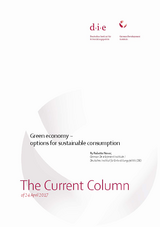Green economy – Options for sustainable consumption
Never, BabetteThe Current Column (2017)
Bonn: German Development Institute / Deutsches Institut für Entwicklungspolitik (DIE) (The Current Column of 24 April 2017)
Bonn. 24 April 2017. For the first time, the achievement of sustainable consumption and production patterns has been explicitly codified (as Sustainable Development Goal 12) in the UN’s 2030 Agenda for Sustainable Development. On the supply side, the green economy is almost an old acquaintance with its resource efficiency standards, emissions requirements and green investment incentives for manufacturing. On the demand side, however, little attention has so far been paid to consumption in discussions on sustainable business practices. It is in this context that the growing number of consumers in middle-income countries could help accelerate the establishment of a green economy. Contrary to popular assumption, it is not the case that nobody in these countries is interested in sustainable development and that there is no way of motivating people to engage in sustainable consumption.
Global consumption trends
While the media hype of recent decades about Africa’s new middle classes was exaggerated, the number of new consumers around the world is now significantly higher than it was ten years ago. Incomes have increased in many developing countries and with them the sale of luxury goods such as mopeds, cars, smartphones and meat products. Industry has long been smelling the enormous potential offered by new sales markets. At the same time, consumption levels continue to rise in industrialised nations. In Germany alone, the market for connected consumer electronics grew by 9% in 2016 compared with the prior year. Many consumer goods are now also produced sustainably on the global market, though they are usually expensive. This situation can be alleviated with state funding and by buyers making intentional purchasing decisions that boost demand for sustainable products. The assumption that the new middle classes are most concerned with flaunting their new status and pay little attention to environmental and social sustainability often results in demand-based green strategies being largely written off from the outset. But is this wise?
Lifestyle: everyone chooses bamboo bicycles over SUVs.
The chances of bamboo bicycles replacing SUVs as status symbols are most likely just as remote in developing countries as they are in Germany. It would also be unrealistic to expect new consumers to be better people and not prone to the draw of lower prices and greater convenience. Ordering the climate-friendly meal in the canteen yet opting for the quick option of driving to the office is a psychological pattern familiar to us yet difficult to break. Sustainable consumption requires us to lead the way globally. If we adopt green habits, standards and status symbols as industrialised nations, then new consumer groups in developing countries and emerging economies may follow suit at some point.
At the same time, there is a need to continue strengthening existing sustainable consumption initiatives in these nations. The growing purchasing power of the new middle classes can influence entire industrial sectors. The beginnings of this can be seen in Brazil, where consumers are being strongly influenced in their buying decisions by proof of commercial responsibility. In Vietnam, young consumers in particular are growing enthusiastic about economical, energy-efficient products. And middle-class parents in Kampala are keener on durable, toxin-free toys than on the cheap, plastic alternatives. Consequently, promoting such smart approaches pays off.
Solutions to the green economy puzzle
For the economy, the relationship between supply and demand is a chicken and egg issue. If there are no sustainable products on the market or they are very expensive, no-one will buy them. If too few products are sold, then it is not worth manufacturing them. We must therefore address demand in order to boost consumption and make production cost-effective. At the same time, manufacturing processes in the green economy must be clean, environmentally friendly and socially responsible. Energy efficiency classes and other consumer information on packaging can be used to build a bridge to consumers. The tools employed by these programmes include information campaigns, the gradual tightening of environmental legislation and the expansion of investment incentives for industry in the first development and production phase. Another option is to conduct more targeted analysis of the motivation, values and desires of new consumer groups in developing countries.
The results could be fed into more systematic education and information programmes and initiatives using relevant role models and ideals, for example by recruiting local music stars as facilitators. The first step should involve making it easier to practice sustainable consumption appropriately in the local value system without making financial concessions. This could be achieved through subsidies and voucher systems. A third option could be to assist consumer organisations and other groups representing the middle classes to become more involved in the development of green economy programmes. What future do these groups see for their children, country and planet?
The intelligent use of consumer power has the potential to inject fresh impetus into the green economy. Sustainable consumption should become a key component in the promotion of this economy.


